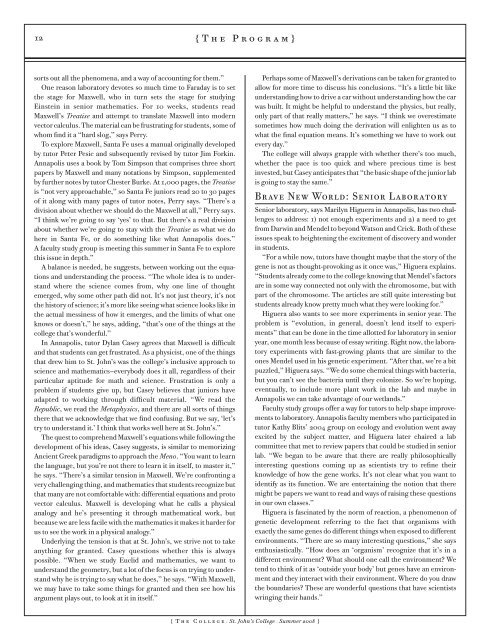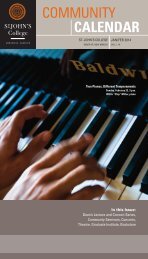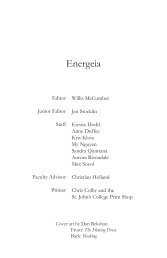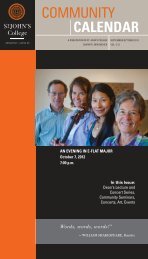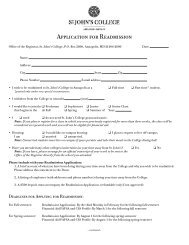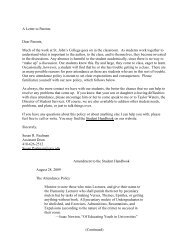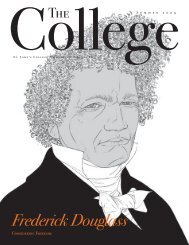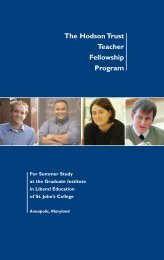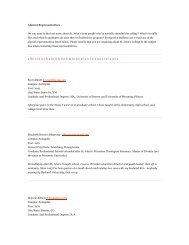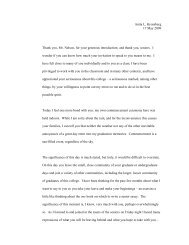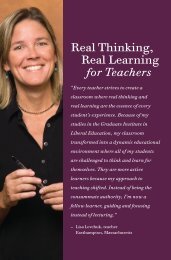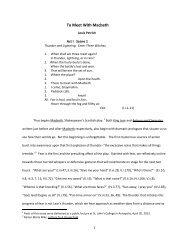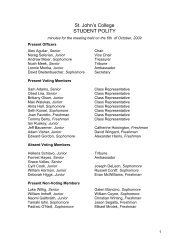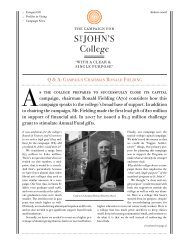Magazine - summer 03 - St. John's College
Magazine - summer 03 - St. John's College
Magazine - summer 03 - St. John's College
Create successful ePaper yourself
Turn your PDF publications into a flip-book with our unique Google optimized e-Paper software.
12<br />
{The Program}<br />
sorts out all the phenomena, and a way of accounting for them.”<br />
One reason laboratory devotes so much time to Faraday is to set<br />
the stage for Maxwell, who in turn sets the stage for studying<br />
Einstein in senior mathematics. For 10 weeks, students read<br />
Maxwell’s Treatise and attempt to translate Maxwell into modern<br />
vector calculus. The material can be frustrating for students, some of<br />
whom find it a “hard slog,” says Perry.<br />
To explore Maxwell, Santa Fe uses a manual originally developed<br />
by tutor Peter Pesic and subsequently revised by tutor Jim Forkin.<br />
Annapolis uses a book by Tom Simpson that comprises three short<br />
papers by Maxwell and many notations by Simpson, supplemented<br />
by further notes by tutor Chester Burke. At 1,000 pages, the Treatise<br />
is “not very approachable,” so Santa Fe juniors read 20 to 30 pages<br />
of it along with many pages of tutor notes, Perry says. “There’s a<br />
division about whether we should do the Maxwell at all,” Perry says.<br />
“I think we’re going to say ‘yes’ to that. But there’s a real division<br />
about whether we’re going to stay with the Treatise as what we do<br />
here in Santa Fe, or do something like what Annapolis does.”<br />
A faculty study group is meeting this <strong>summer</strong> in Santa Fe to explore<br />
this issue in depth.”<br />
A balance is needed, he suggests, between working out the equations<br />
and understanding the process. “The whole idea is to understand<br />
where the science comes from, why one line of thought<br />
emerged, why some other path did not. It’s not just theory, it’s not<br />
the history of science; it’s more like seeing what science looks like in<br />
the actual messiness of how it emerges, and the limits of what one<br />
knows or doesn’t,” he says, adding, “that’s one of the things at the<br />
college that’s wonderful.”<br />
In Annapolis, tutor Dylan Casey agrees that Maxwell is difficult<br />
and that students can get frustrated. As a physicist, one of the things<br />
that drew him to <strong>St</strong>. John’s was the college’s inclusive approach to<br />
science and mathematics—everybody does it all, regardless of their<br />
particular aptitude for math and science. Frustration is only a<br />
problem if students give up, but Casey believes that juniors have<br />
adapted to working through difficult material. “We read the<br />
Republic, we read the Metaphysics, and there are all sorts of things<br />
there that we acknowledge that we find confusing. But we say, ‘let’s<br />
try to understand it.’ I think that works well here at <strong>St</strong>. John’s.”<br />
The quest to comprehend Maxwell’s equations while following the<br />
development of his ideas, Casey suggests, is similar to memorizing<br />
Ancient Greek paradigms to approach the Meno. “You want to learn<br />
the language, but you’re not there to learn it in itself, to master it,”<br />
he says. “There’s a similar tension in Maxwell. We’re confronting a<br />
very challenging thing, and mathematics that students recognize but<br />
that many are not comfortable with: differential equations and proto<br />
vector calculus. Maxwell is developing what he calls a physical<br />
analogy and he’s presenting it through mathematical work, but<br />
because we are less facile with the mathematics it makes it harder for<br />
us to see the work in a physical analogy.”<br />
Underlying the tension is that at <strong>St</strong>. John’s, we strive not to take<br />
anything for granted. Casey questions whether this is always<br />
possible. “When we study Euclid and mathematics, we want to<br />
understand the geometry, but a lot of the focus is on trying to understand<br />
why he is trying to say what he does,” he says. “With Maxwell,<br />
we may have to take some things for granted and then see how his<br />
argument plays out, to look at it in itself.”<br />
Perhaps some of Maxwell’s derivations can be taken for granted to<br />
allow for more time to discuss his conclusions. “It’s a little bit like<br />
understanding how to drive a car without understanding how the car<br />
was built. It might be helpful to understand the physics, but really,<br />
only part of that really matters,” he says. “I think we overestimate<br />
sometimes how much doing the derivation will enlighten us as to<br />
what the final equation means. It’s something we have to work out<br />
every day.”<br />
The college will always grapple with whether there’s too much,<br />
whether the pace is too quick and where precious time is best<br />
invested, but Casey anticipates that “the basic shape of the junior lab<br />
is going to stay the same.”<br />
Brave New World: Senior Laboratory<br />
Senior laboratory, says Marilyn Higuera in Annapolis, has two challenges<br />
to address: 1) not enough experiments and 2) a need to get<br />
from Darwin and Mendel to beyond Watson and Crick. Both of these<br />
issues speak to heightening the excitement of discovery and wonder<br />
in students.<br />
“For a while now, tutors have thought maybe that the story of the<br />
gene is not as thought-provoking as it once was,” Higuera explains.<br />
“<strong>St</strong>udents already come to the college knowing that Mendel’s factors<br />
are in some way connected not only with the chromosome, but with<br />
part of the chromosome. The articles are still quite interesting but<br />
students already know pretty much what they were looking for.”<br />
Higuera also wants to see more experiments in senior year. The<br />
problem is “evolution, in general, doesn’t lend itself to experiments”<br />
that can be done in the time allotted for laboratory in senior<br />
year, one month less because of essay writing. Right now, the laboratory<br />
experiments with fast-growing plants that are similar to the<br />
ones Mendel used in his genetic experiment. “After that, we’re a bit<br />
puzzled,” Higuera says. “We do some chemical things with bacteria,<br />
but you can’t see the bacteria until they colonize. So we’re hoping,<br />
eventually, to include more plant work in the lab and maybe in<br />
Annapolis we can take advantage of our wetlands.”<br />
Faculty study groups offer a way for tutors to help shape improvements<br />
to laboratory. Annapolis faculty members who participated in<br />
tutor Kathy Blits’ 2004 group on ecology and evolution went away<br />
excited by the subject matter, and Higuera later chaired a lab<br />
committee that met to review papers that could be studied in senior<br />
lab. “We began to be aware that there are really philosophically<br />
interesting questions coming up as scientists try to refine their<br />
knowledge of how the gene works. It’s not clear what you want to<br />
identify as its function. We are entertaining the notion that there<br />
might be papers we want to read and ways of raising these questions<br />
in our own classes.”<br />
Higuera is fascinated by the norm of reaction, a phenomenon of<br />
genetic development referring to the fact that organisms with<br />
exactly the same genes do different things when exposed to different<br />
environments. “There are so many interesting questions,” she says<br />
enthusiastically. “How does an ‘organism’ recognize that it’s in a<br />
different environment? What should one call the environment? We<br />
tend to think of it as ‘outside your body’ but genes have an environment<br />
and they interact with their environment. Where do you draw<br />
the boundaries? These are wonderful questions that have scientists<br />
wringing their hands.”<br />
{ The <strong>College</strong> • <strong>St</strong>. John’s <strong>College</strong> • Summer 2008 }


